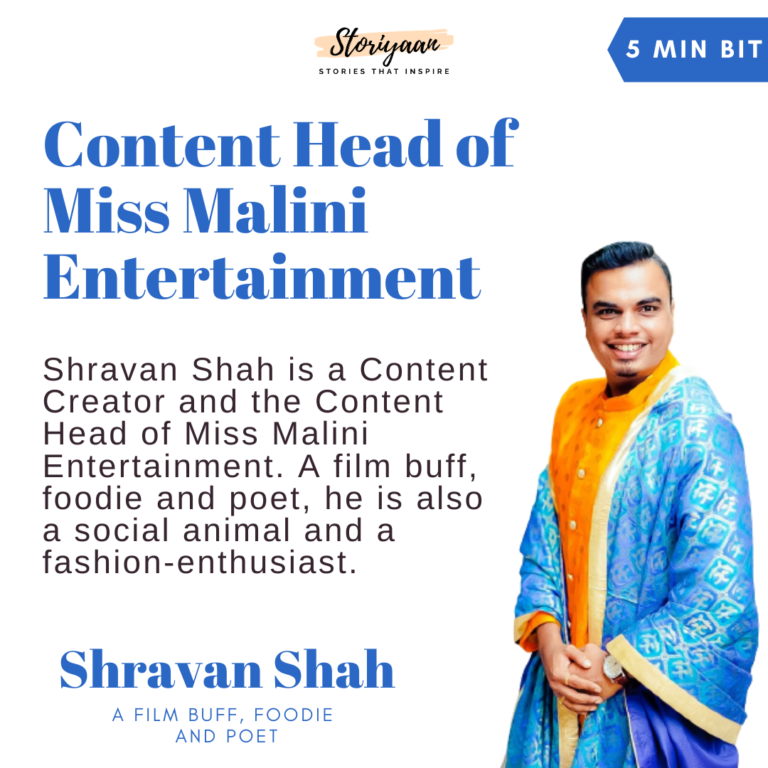Shravan Shah is a Content Creator and the Content Head of Miss Malini Entertainment. A film buff, foodie and poet, he is also a social animal and a fashion-enthusiast.
Team Storiyaan spoke with the creator-head in a candid chat.

Content Is Passion! - Shravan Shah
Interview
Questions and answers
Ravan speaks a very entertaining name, what made you use this particular name?
My name Shravan has ‘Ravan’ in it. Throughout my childhood, everyone at school knew me as Ravan. It is a nickname that has stayed with me. Besides, Ravan as a character has some weight to it. Hence, I used it as my Instagram handle “Ravan speaks”.
Being the content head at Miss Malini, you must have to keep coming up with creative and exciting content. How do you find ideas for this content? How do you make sure that the content is relevant to the audience?
If you go through our platform Missmalini Bollywood, you’ll find that we experiment on various things. We strive to be authentic. During the lockdown, we came up with the idea of recreating celebrity looks. We also worked on recasting Hollywood shows and films with Bollywood actors starring in them. We executed these two ideas fundamentally. I do not get inspired by anything in particular. Sometimes I am struck with an idea at night or while I am working during the day.
Being a reporter in the world of Bollywood, you must have inside access into the industry. What is your take on the nepotism debate that has been going on in the country? Is there something that the people do not know about?
Firstly, people know everything that has been happening. There are only some facts that they might disagree with. About the nepotism debate, it exists everywhere and not just in Bollywood. For example, if I am a doctor, I’d want my child to pursue a career in a similar field. If they seek it or not, is their choice. However, if they do, I will be responsible for helping them and catering to them, to make it easier for them. It’s a basic parental tendency. The only difference is actors are always in the limelight—people look out for the blame game to happen. Recently, over 80k cases have been recorded in a single day. That does not seem like a priority against the nepotism debacle. Nepotism is subjective. It might be fatal for some, whereas the others might not care.
Do you sometimes think the facts that reach people are altered as well?
Not really. Let’s say I tell you that I am the best journalist out there. I alter some facts and tell you that the water is black, believe me, it is. You’ll think this guy is crazy. Water is transparent. Wouldn’t you believe me, right? It’s because you have a mind of your own. When I write something, I cannot think my readers are stupid and eat everything I feed them. I don’t know what has happened to journalism in the past few months, but the first and the most fundamental rule we are taught as journalists is – state facts and not your opinions. Your job is not about passing a judicial judgment; you have to state facts and not make it vindictive.
How do you keep yourself informed about all that is happening in the industry? And when you conduct interviews, how do you conduct your research?
In the past 7 years of working in the industry, initially, I always carried my iPad and made notes wherever I went. However, in the past 3-4 years, I have stopped making questions for the interview. People ask me if I can interview so and so, I say sure. When they ask me to send them the questions or the context of the conversation, I tell them I don’t know. It has to be spontaneous. I base my questions on the flow of our conversation. However, when you do your research, always make sure you go through their social media accounts if there was something that created a huge buzz due to something they posted on their social media. Also, make sure you read up on their past, present and future projects.
What is it that motivated you to become a journalist? Were you always interested in writing from a young age?
Funny enough, I graduated BMM with an advertising major. I used to HATE writing. I hated it so much that even for my assignments during college, I copy-pasted everything from Google. I did it in a way that I’d never get caught. After graduation, I got my 1st job as a VFX producer at Rajshri Entertainment. While working there, I was forced to write something. I did not know, and although I shouldn’t have, I ended up copy-pasting again. They found out, and someone on my team came and trained me. Instead of training me, she said, “Shravan wait. I will tell you how to go about it. You read this? Now end up writing the same line but, in terms of how you would say it” and that’s how it started. I was like that’s easy. I began to love writing, and there was no turning back. After I left Rajshri, my profession changed from being a VFX producer to a journalist.
Is Bollywood as glamorous as it looks from the outside? What are some of the advantages and disadvantages of your job?
Glamorous? Yes. There is a lot of glitz and glamour, but there is also a lot of hard work that goes behind it. Everyone works hard to be where they are in the industry. The advantages of working in the industry… well, I am here because I love this job and I love writing. If you wake me up at 3 am and tell me, “Shravan, this has happened.” I’ll get up and start writing right away. The only “disadvantage” is that I don’t have a 9 to 5 job. News can pop up anytime, and you have to be ready for it. But, as I said, I am here because I love it and I wouldn’t be anywhere else in the world.
Being a journalist, how do you manage the stress of tight deadlines?
If I have a deadline, I get it done by the end of the day. I start collecting matters on what I have to work on. I read about it, and I am a multitasker. I do two things at a time, and I do it efficiently. Let’s say I have a video submission – like I have to write and record an interview – and submit it on maybe Friday. I know the interview will take place on Thursday so I will keep my slates ready before then. I’ll keep the package, music, everything else prepared and visualise how I want the interview to take place. So when I start the interview, I make sure it goes the way I planned it to. I talk to the editor on what I feel should be kept, and then it is released. By now, I know how things would go 95% of the time and how they would shape up.

